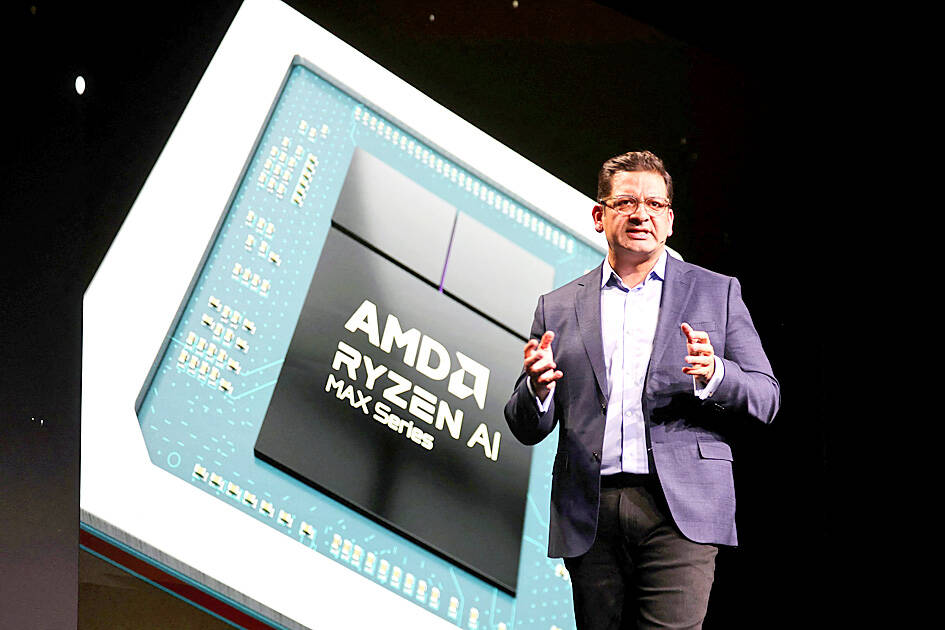The Fair Trade Commission has approved Advanced Micro Devices Inc’s (AMD) bid to fully acquire ZT International Group Inc for US$4.9 billion, saying it would not hamper market competition.
As AMD is a fabless company that designs central processing units (CPUs) used in consumer electronics and servers, while ZT is a data center manufacturer, the vertical integration would not affect market competition, the commission said in a statement yesterday.
ZT counts hyperscalers such as Microsoft Corp, Amazon.com Inc and Google among its major clients and plays a minor role in deciding the specifications of data centers, given the strong bargaining power of those technology giants, the commission said.

Photo: Reuters
After acquiring ZT, AMD would still face strong competition from market leaders — Intel Corp, the world’s biggest supplier of CPUs used in data centers, and Nvidia Corp, the top supplier of graphics processing units (GPUs) for data centers, the commission said.
In addition, AMD’s local suppliers expect their business partnerships with the new entity would remain intact following the merger, it said, adding that some suppliers have said the deal would not block their access to the market.
“As the merger of the companies would not fan fears of hindering competition, the commission would not ban the consolidation,” it said.
The strategic deal marks the next major step in AMD’s artificial-intelligence (AI) strategy to deliver leadership AI training and inferencing solutions based on innovating across silicon, software and systems, the company said in August last year.
ZT’s extensive experience designing and optimizing cloud computing solutions would also help cloud and enterprise customers significantly accelerate the deployment of AMD-powered AI infrastructure at scale, it said.
AMD said it expects the transaction to be accretive on a non-GAAP basis by the end of this year. The US firm has agreed to acquire ZT in a cash and stock transaction valued at US$4.9 billion, inclusive of a contingent payment of up to US$400 million based on certain post-closing milestones.
Inventec Inc (英業達), the biggest shareholder of ZT with a 10 percent share, said it would book NT$13.16 billion (US$398 million) in disposal gains from the deal.

In Italy’s storied gold-making hubs, jewelers are reworking their designs to trim gold content as they race to blunt the effect of record prices and appeal to shoppers watching their budgets. Gold prices hit a record high on Thursday, surging near US$5,600 an ounce, more than double a year ago as geopolitical concerns and jitters over trade pushed investors toward the safe-haven asset. The rally is putting undue pressure on small artisans as they face mounting demands from customers, including international brands, to produce cheaper items, from signature pieces to wedding rings, according to interviews with four independent jewelers in Italy’s main

Japanese Prime Minister Sanae Takaichi has talked up the benefits of a weaker yen in a campaign speech, adopting a tone at odds with her finance ministry, which has refused to rule out any options to counter excessive foreign exchange volatility. Takaichi later softened her stance, saying she did not have a preference for the yen’s direction. “People say the weak yen is bad right now, but for export industries, it’s a major opportunity,” Takaichi said on Saturday at a rally for Liberal Democratic Party candidate Daishiro Yamagiwa in Kanagawa Prefecture ahead of a snap election on Sunday. “Whether it’s selling food or

CONCERNS: Tech companies investing in AI businesses that purchase their products have raised questions among investors that they are artificially propping up demand Nvidia Corp chief executive officer Jensen Huang (黃仁勳) on Saturday said that the company would be participating in OpenAI’s latest funding round, describing it as potentially “the largest investment we’ve ever made.” “We will invest a great deal of money,” Huang told reporters while visiting Taipei. “I believe in OpenAI. The work that they do is incredible. They’re one of the most consequential companies of our time.” Huang did not say exactly how much Nvidia might contribute, but described the investment as “huge.” “Let Sam announce how much he’s going to raise — it’s for him to decide,” Huang said, referring to OpenAI

The global server market is expected to grow 12.8 percent annually this year, with artificial intelligence (AI) servers projected to account for 16.5 percent, driven by continued investment in AI infrastructure by major cloud service providers (CSPs), market researcher TrendForce Corp (集邦科技) said yesterday. Global AI server shipments this year are expected to increase 28 percent year-on-year to more than 2.7 million units, driven by sustained demand from CSPs and government sovereign cloud projects, TrendForce analyst Frank Kung (龔明德) told the Taipei Times. Demand for GPU-based AI servers, including Nvidia Corp’s GB and Vera Rubin rack systems, is expected to remain high,